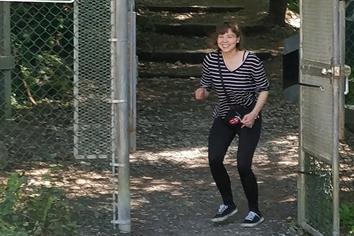Clients at the Red Fish Healing Centre reach new heights on the Grouse Grind

On a sunny July morning, we gather in the parking lot of Grouse Mountain—Phillip and Courtney, two clients from the Red Fish Healing Centre, Joel, a recreational therapist, and me, Orna Daly, communications officer with BCMHSUS—coming together to tackle one of the Lower Mainland’s most notorious hikes, the Grouse Grind.
“We have been training for this for a while,” Joel tells me, “doing hill sprints on the grounds of Red Fish with sand bags on our shoulders. Phillip has been really committed to fitness since coming here so I knew he would be interested. Courtney was new and I didn’t know her well but at training, the goal was to do ten hill sprints and Courtney did twenty. These two really stuck with the sessions, showed up when they needed to, and were keen to see this through.”
Before setting off on the 2,830-step climb, Joel guided us through a light stretching session and gave tips for how to approach the hike.
The advice of the day? “Don’t stop moving; slow down if you need to, but don’t stop,” said Joel, adding that this advice applied to all aspects of recovery. “When groups get overwhelming or you’re having a tough time with your mental health, it’s important to slow down and take wellness breaks, but try to never give up.”
Beginning the climb
Starting in stages so we could all finish together, Phillip, 22, and myself, 31, went first. Along the way, he tells me about how exercise has helped his recovery.
“I like the health aspects of hiking,” he explains. “It makes you feel good, nourishes you, keeps you well and gives you more energy in your day. I’m sober now for three months and even being sober, exercise gives me a bit of a buzz.”
Phillip grew up in Burnaby and has done the Grouse Grind once before as a teenager, but says he is fitter now.

I’ve been at Red Fish for just over three months and in that time, I’ve lost 30lbs. I still smoke, which makes this tough, but I’ve been participating in activities and working out at the gym so I was really excited to do this.”
Following Joel’s advice, Phillip and I do our best to keep moving, even when our breath gets short and our legs feel heavy. As we reach the halfway point, Joel and Courtney catch up and we pause for some water.
“I want to run all the time but then I have to slow down,” Courtney tells me. “There’s a lot of adrenaline going.”
Seeing a new side of the Lower Mainland and of themselves
Courtney, 21, is Gitxsan from Hazelton, B.C. and is doing the Grind for the first time.
“I trained a lot in the beginning and it really helped me with my anxiety,” she says. “It also helps me because I don’t want to smoke after I exercise. I would like to do more things like this to help me feel better and get off smoking.”

Throughout the hike, Courtney’s determination was clear. As she enjoys well-earned hydration and rest at the top of the mountain, she says “I was complaining at the start but then I saw another girl who I knew I wanted to pass and I did it! I was the fastest girl in my school and today it only took me an hour and twenty to get up this hill.”
Recreational outings like this one give Courtney, Phillip and other clients the opportunity to advance their recovery in a different way.
“When I’m at Red Fish, it can feel like a hospital,” Courtney says. “But when I’m doing things like this, it feels more like rehab, like recovery.”
Recreation therapy also give clients the chance see scenic parts of the region and to try new things.

“My hometown is really small, like a thousand people,” Courtney says. “There isn’t much to do there but there are mountains and some hiking. I wish there was more because people would be healthier and in better shape. I would love the opportunity to do this kind of thing in the future!”
Recreation therapy involves everything from workouts in the centre’s fitness room, to kayaking, paddle boarding, and snow shoeing in the winter. Whatever the activity, Joel sees a marked difference in the clients who participate.
“We know that these outings help, not only on the day itself but also the day before when clients are excited and the day after when they are feeling good about their achievement,” he explains. “In a seven day week, that’s three days where mental health is improved. My hope is that we can get some more outings planned and a sort of passport system up and running so clients can aim to tick off new challenges. The Stanley Park Seawall, Burnaby Mountain, Quarry Rock, there’s so much we can do.”
After enjoying lunch in the sun and watching the grizzly bears take a bath, we took the gondola back down, giving us a real sense of just how high we had climbed.
Every evening at Red Fish, clients come together for an evening check-in group and rate their day on a scale of one to ten. When I ask how today rates, without hesitation, Courtney and Phil tell me it was a ten, and they cannot wait for the next challenge.